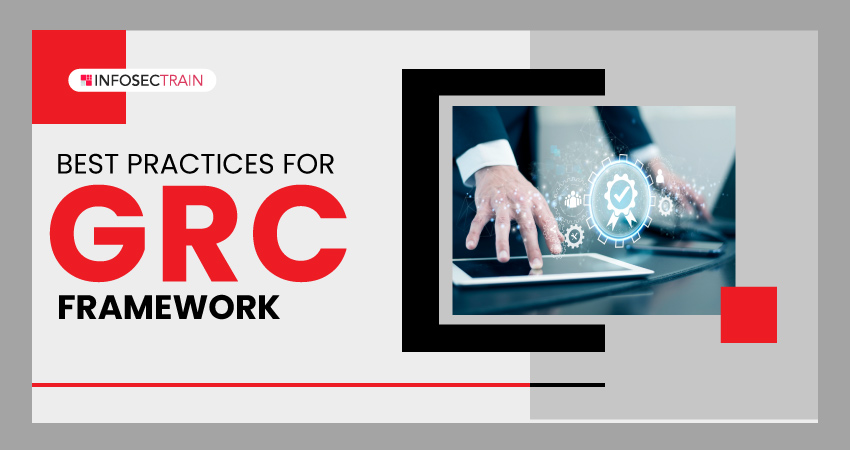Best Practices for GRC Framework
Organizations deal with various GRC difficulties in today’s complicated marketplace, including competitive landscape, customer expectations, economic trends, and numerous other factors that shape business activities within an organization’s broader economic and business environment. These difficulties include regulatory changes, cybersecurity concerns, and internal processes. For ethical operations and stakeholder trust, a well-structured GRC framework is crucial. By implementing best practices, you can enhance GRC, reduce risks, and ensure compliance while preserving your company’s reputable reputation. GRC should be prioritized as a strategic endeavor for company growth in today’s business climate.

Table of Contents
What is GRC?
Best Practices for GRC Framework
Benefits of Implementing a GRC Framework
What is GRC?
GRC, or Governance, Risk Management, and Compliance, is a holistic approach organizations use to manage and align their operations with regulatory requirements, risk mitigation, and ethical standards. It involves creating policies, processes, and controls to ensure proper governance, identifying and managing risks that could impact the organization, and adhering to relevant compliance mandates. GRC helps organizations proactively address potential issues, maintain transparency, and ensure ethical and compliant operations to build stakeholder trust.
Best Practices for GRC Framework
1. Begin with the Fundamentals: Before implementing a GRC framework, it is crucial to understand the fundamental principles of governance, risk management, and compliance. To achieve this, one must also understand the multiple types of risks that the organization faces, the legal requirements that the company must follow, and the various frameworks for risk mitigation and compliance management.
2. Define Clear Objectives and Scope: First, establish the objectives and scope of your GRC framework. Then, determine your industry and organization’s specific risks, regulations, and compliance standards. The clarity in this area ensures that efforts are focused, and resources are allocated effectively.
3. Risk Assessment: Conduct regular risk assessments with the participation of all relevant departments and stakeholders. This method identifies and prioritizes possible risks and vulnerabilities. Effective GRC depends on it since it enables organizations to allocate resources where they are most needed.
4. Choose the Right Tools and Technologies: When establishing a GRC framework, consider utilizing various tools and technologies. These resources can automate routine tasks, facilitate risk management processes, and monitor adherence to compliance standards. By effectively implementing these tools, organizations can streamline GRC operations, enhance efficiency, and ensure proactive monitoring and response to risks and compliance requirements.
5. Ensure Continuity: A GRC framework is not a one-time setup but an ongoing process. It must evolve with organizational changes, necessitating regular reviews and adjustments to remain effective. This ensures the framework remains aligned with current risks, regulations, and operational dynamics.
6. Evaluate and Communicate Progress: Assessing and reporting on the advancement of your GRC framework is crucial. It provides insights into its effectiveness, revealing successful aspects and areas needing enhancement. Doing so lets you pinpoint where improvements are necessary and refine your GRC efforts accordingly.
7. Seek Guidance from a GRC Specialist: If your organization lacks in-house expertise, consider enlisting a GRC expert to help with framework implementation. This ensures that you benefit from the knowledge and experience of a professional who can effectively guide the process and address your GRC needs.
Benefits of Implementing a GRC Framework
1. Reduce Risk:
GRC frameworks assist in identifying and mitigating risks, reducing the possibility of financial losses, reputational damage, and legal repercussions. They provide:
- A proactive approach to risk management.
- Assistance to organizations in protecting their assets and upholding regulatory compliance.
- Long-term sustainability and profitability.
2. Improve Compliance:
GRC frameworks help organizations adhere to legal and regulatory standards, protecting them from potential fines and harsh penalties. This improves compliance. By implementing rigorous compliance systems, organizations can show their dedication to ethical business practices, lower legal risks, and ensure ethical corporate behavior. This builds confidence among stakeholders.
3. Boost Operational Efficiency:
GRC frameworks allow organizations to improve productivity by automating processes and streamlining operations. This simplifies and makes processes more efficient, saving time and money. Organizations can better manage resources and increase their overall performance and competitiveness using GRC tools.
4. Cost Savings:
GRC frameworks help organizations reduce costs through risk mitigation and improved compliance. As a result, there will be fewer financial fines, insurance premiums, and legal costs. Organizations can allocate resources more effectively and safeguard financial stability by proactively addressing GRC components.
5. Protect the Reputation of Your Brand:
GRC frameworks help to protect a company’s reputation. They promote trust among clients, partners, and stakeholders by demonstrating their dedication to efficient risk management and compliance. This trust is essential for preserving a favorable reputation, attracting new possibilities, and achieving long-term success in a market that is becoming more competitive.
About InfosecTrain
InfosecTrain is a premier IT security training and consulting organization specializing in comprehensive IT security training. Our highly qualified, industry-experienced trainers provide interactive sessions and readily address your queries. The main focus of our GRC RSA Archer training is mastering enterprise governance, risk management, and compliance (GRC). With topics like risk assessment, policy management, incident handling, audit oversight, and business continuity planning, this course gives you the tools to manage risks and comply with regulations. Join us to expand your knowledge of GRC.
TRAINING CALENDAR of Upcoming Batches For RSA Archer
| Start Date | End Date | Start - End Time | Batch Type | Training Mode | Batch Status | |
|---|---|---|---|---|---|---|
| 01-Jun-2024 | 30-Jun-2024 | 19:00 - 22:00 IST | Weekend | Online | [ Open ] |




 1800-843-7890 (India)
1800-843-7890 (India) 
